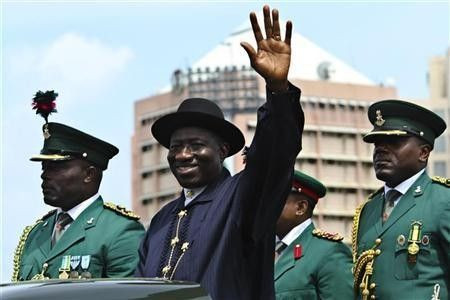Nigerian Gov't Plans Boko Haram Negotiations

The Nigerian government said it will begin talks with rebel Islamic militants Boko Haram this Tuesday.
President Goodluck Jonathan announced over the weekend that he would open a negotiation panel to serve "as a liaison between the federal government... and Boko Haram and to initiate negotiations with the sect." The seven-person committee will be chaired by Borno civil servant Usman Gaji Galtimari, according to a statement. Borno is a northern Nigerian state, which has been home to most of Boko Haram's attacks.
Boko Haram -- which roughly translates to "Western education is a sin" -- is a three year-old anti-government movement that aims to turn Nigeria into an Islamic nation. Active almost exclusively in the country's Muslim north, Boko Haram has initiated a bloody campaign since the re-election of President Jonathan in April.
Immediately after Jonathan's inauguration, 800 people were killed in violence in the northern states. Boko Haram mainly targets government officials and policemen in the city of in Maiduguri, which the BBC recently described as "Nigeria's city of fear." Maiduguri is the capital of the Borno state -- its government said last week it will consider implementing Sharia Law to appease the insurgents.
Attacks have ranged from car bombings to drive-by-shootings, and about 250 people have been killed in the last two months, according to Amnesty International.
The government dialogues aim to find solutions on how to end the crisis, outlining potential negotiation points. Jonathan said that he would only accept concessions if the Borno government resigns. The first panel report is due Aug. 16.
Boko Haram has not yet commented on President Jonathan's statement.
The talks will also focus on the country's security forces, ensuring that the military and the state police act with "professionalism" when engaging with the rebel group. Last month, a military-police Joint Task Force (JTF) was accused of killing civilians and burning down houses in Maiduguri.
"Men were dragged out of their homes and shot dead by the JTF claiming that they were Boko Haram members. They killed our husbands and youths for nothing," a witness told news agency All Africa in July.
But some African scholars are skeptical about such "negotiations." The Council on Foreign Relations' John Campbell fears that Boko Haram is too disorganized to be appeased by government policy.
"It's quite likely that Boko Haram in one city is different than Boko Haram in a different city," Campbell, who is the Ralph Bunche Senior Fellow for Africa Policy Studies at the CFR, told IBTimes in July.
"There's no central organization or leadership. It's not a coherent group," he added.
Campbell believes that the Boko Haram situation is rooted in decades of malcontent between the north and south in Nigeria. The north feels under-represented, and even shunned, by the Christian south.
Sectarian violence is not a recent phenomenon. Over the past thirty years, riots and violent attacks in northern Nigerian cities like Kano, Maiduguri and Kaduna have sprung up over and over again.
"Violence is always beneath the surface," Campbell commented. "The particular form it takes can be quite variable."
Campbell feels that the best negotiating chips are political positions. If Jonathan appointed northerners into high ranking political positions in his cabinet, it would go a long way to making the north feel represented in Abuja.
"An awful lot is riding on Jonathan's political skill," Campbell noted. "He has shown patience thus far, but others ask what has he done? The political challenges he faces are enormous. He's got to work very carefully."
© Copyright IBTimes 2025. All rights reserved.





















